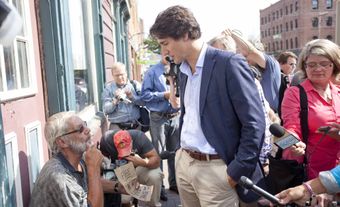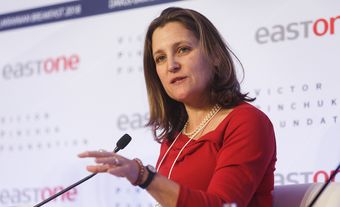William Francis Morneau, businessman, philanthropist, politician, federal finance minister 2015–20 (born 7 October 1962, in Toronto, Ontario). Bill Morneau became president of his father’s finance company, Morneau and Associates, in 1992. He grew the 200-person company into Morneau Shepell, Canada’s largest provider of human resources services, with a staff of more than 4,000 people and a capitalization of over $1 billion. After serving as chair of the C.D. Howe Institute, Morneau was elected as the Member of Parliament (MP) for Toronto Centre in 2015. He was immediately appointed finance minister. Morneau served as MP and finance minister until his resignation on 17 August 2020. He resigned amid a conflict of interest investigation involving the WE Charity.

Early Years, Education and Family
Bill Morneau was born and raised in Toronto. His mother was an emergency room nurse. His father, Bill Morneau Sr., started W.F. Morneau and Associates when Bill Jr. was four years old. The finance company specialized in insurance and employee benefit plans.
Morneau attended Senator O’Connor College School, a Catholic high school in Toronto. He earned a Bachelor of Arts from the University of Western Ontario (now Western University) and a Master of Science in economics from the London School of Economics. He worked briefly with Lloyds of London and then at a branch of his father’s company in Chicago. He then studied in France, earning a Master of Business Administration at the prestigious Institut Européen d'Administration des Affaires (INSEAD).
In 1995, Morneau married Nancy McCain, a scion of the New Brunswick-based multinational McCain Foods corporation. They have four children: Henry, Edward, Clare and Grace.
Early Business Career
Bill Morneau first demonstrated his entrepreneurial skills when at age 17. He borrowed $1,500 from his father to start a swimming pool maintenance service. Its success financed most of his university expenses.
In 1987, at age 25, Morneau was the vice president and marketing manager for his father’s company in the United States. He later returned to Canada to work in the Canadian branch of Morneau and Associates. In 1992, his father became chairman and Morneau became the firm’s president. He was also named CEO in 1998.
In 1997, Morneau and Associates bought Sobeco. This doubled the company’s number of employees and made it a major player in the Canadian pension investment industry. In 2005, the company became publicly traded. When it purchased Shepell-fgi to become Morneau Shepell in 2008, it became Canada’s largest provider of human resources services. It had a staff of more than 4,000 people and a capitalization of over $1 billion. In 2001, Morneau was named one of Canada’s Top 40 Under 40.
In 2010, Morneau became chair of the C.D. Howe Institute, one of the country’s leading economic think tanks. In 2012, Morneau was asked by Ontario’s Liberal government to provide advice on public sector pension plans. In 2014, he sat on an expert panel on retirement security, which recommended a mandatory provincial pension plan.
Political Career
Morneau resigned from his position with the C.D. Howe Institute in February 2014, after Gerald Butts, a friend and political advisor of Liberal Party leader Justin Trudeau, approached Morneau about running for political office. They chose the Liberal stronghold of Toronto Centre. After winning the Liberal party nomination, Morneau handily won a seat in the House of Commons in the October 2015 election with 58 per cent of the vote.
Prime Minister Trudeau immediately appointed Morneau finance minister. One of Morneau’s primary goals in the role was to narrow the growing gap between wealthy, middle-class and working-class Canadians. (See also Social Class; Income Distribution.) In January 2016, he introduced legislation to increase the tax rates on those making more than $200,000 a year while decreasing the tax rates for those earning less. Other legislation replaced the Universal Child Care benefit with a new Canada Child Benefit; this allocated a monthly tax-free payment to middle and working-class families with children. Morneau said that the program would lift 300,000 Canadian children out of poverty. In 2021, a government review found that it had benefitted 450,000 children. Many think tanks also concluded that there were far fewer children in poverty in Canada than there was before the policy.
Morneau ended the ability of wealthy Canadians to reduce their taxes by employing family members. He was forced to backtrack after a concerted protest by those who benefited from the strategy, particularly farmers. As finance minister, Morneau also prepared annual federal budgets while overseeing the Royal Canadian Mint, the Canada Pension Plan Investment Board, and tariff and financial regulations. He represented Canada at meetings of the G7, the G20, the International Monetary Fund and the World Bank.
In 2019, Morneau was re-elected with 57 per cent of the vote and remained finance minister. In 2020, he led the government’s response to the COVID-19 pandemic. The economy was largely shutdown and a host of financial support programs for businesses and Canadians were quickly developed and implemented.
Controversies
In October 2016, Morneau introduced Bill C-27. It proposed changes to private pension plans and would have benefitted pension management companies in Canada, including his own. In 2017, Morneau was criticized for not having placed his Morneau Shepell shares in a blind trust after he was elected. He would have It was suggested that, because his company dealt with pensions, he could derived personal financial benefit had Bill C-27 come into force and not been scrapped. He was also criticized for not having told a federal ethics commissioner that a corporation he owned was the owner of a French villa he enjoyed on family vacations. In October 2017, Morneau announced that all his assets would be placed in a blind trust and that he would sell his one million Morneau Shepell shares, at that point worth $20 million. He announced that he would donate to charity all the profit earned from the shares since he became finance minister. That sum ultimately totalled about $5 million.
Canada Student Service Grant Controversy
On 25 June 2020, the federal government announced the Canada Student Service Grant (CSSG) program. This new $912 million program would help post-secondary students who, due to the COVID-19 pandemic, were unable to find jobs to help finance their education. The program was to be administered by the WE Charity, the non-profit part of WE, a Canadian-based organization that ran educational and social justice programs for young people in Canada and internationally. (See also Craig Kielburger.)
Shortly after the announcement, opposition party members noted that Prime Minister Trudeau and Morneau both had family ties to WE. Despite this, they had not recused themselves from Cabinet discussions when it was decided to grant the untendered contract to the charity. One of Morneau's daughters worked at ME to WE Foundation and another daughter had spoken at WE Day events. It was then revealed that WE Charity had paid $41,000 in expenses for Morneau to travel to Ecuador and Kenya to see the organization’s operations there. Morneau said that he believed the expenses had already been repaid and then repaid them.
Amid the CSSG controversy (popularly referred to by media as the WE Scandal or WE Charity Scandal), and reported differences with Trudeau over the best approaches to post-pandemic recovery, Morneau resigned as MP and finance minister on 17 August 2020. During his resignation, Morneau announced that he was leaving politics to become Canada’s nominee for Secretary-General of the Organisation for Economic Co-operation and Development (OECD).
Federal Ethics Commissioner Mario Dion investigated the possible conflict of interest between Prime Minister Justin Trudeau, Morneau, the WE Charity and the CSSG program. On 13 May 2021, Dion cleared Prime Minister Trudeau of any wrongdoing. However, he concluded that Morneau had violated several sections of the Conflict of Interest Act by failing to recuse himself from decisions related to WE and by giving WE preferential treatment.
Post-Politics
In 2020–21, Morneau was a senior fellow at Yale University's Jackson Institute for Global Affairs. He taught a course on global economic policy making. In January 2021, Morneau announced that he lacked the international support needed to become Secretary-General of the Organisation for Economic Co-operation and Development. He withdrew his nomination.
Philanthropy
Morneau and his wife Nancy have actively supported the arts through philanthropic donations and service on boards. They fund a University of Toronto scholarship program for young women. He chaired the Board of St. Michael’s Hospital in Toronto. He also volunteered with and donated money to Covenant House, an organization that helps disadvantaged youth in Toronto. Morneau and his company made significant donations to the United Nations Refugee Agency. This led to the creations of the Morneau Shepell Secondary School for Girls in northern Kenya. It helps refugee girls from Somalia, Ethiopia, and South Sudan.

 Share on Facebook
Share on Facebook Share on X
Share on X Share by Email
Share by Email Share on Google Classroom
Share on Google Classroom


